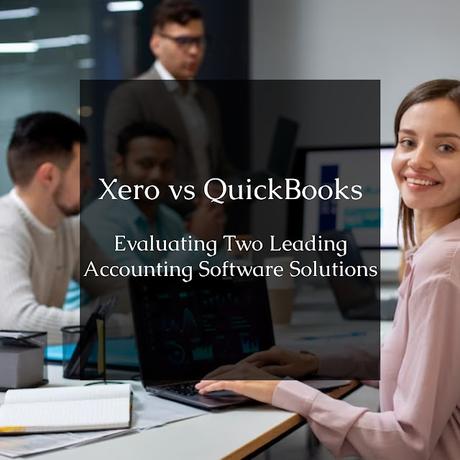
Xero vs QuickBooks: Evaluating Two Leading Accounting Software Solutions. Are you tired of managing your business’s finances manually? Accounting software can streamline the process, saving time and reducing errors. Xero and QuickBooks are two of the most popular options available. But which one is right for you?
In this blog post, we’ll evaluate Xero vs QuickBooks both solutions to help you determine which one fits your needs best. So sit back, relax and let's dive into the world of Xero vs QuickBooks!
Xero Overview
Xero is a cloud-based accounting software solution that was founded in 2006. It has become increasingly popular due to its user-friendly interface and comprehensive features which cater to small and medium-sized businesses.
One of the key selling points of Xero is its ease of use. The platform's intuitive design makes it easy for users to navigate their way around the system, even if they have no prior experience with other accounting software solutions.
Another important feature is Xero's ability to automate many manual processes, freeing up valuable time for business owners and accountants alike. This includes everything from invoicing and bill payments to bank reconciliations and financial reporting.
Perhaps one of the most compelling reasons why so many people choose Xero over other accounting software options is its wide range of integrations with third-party apps like Stripe, PayPal, Shopify, and more. These integrations help streamline workflows by allowing data transfer between platforms without any additional effort required on behalf of the user.
Xero offers an impressive suite of tools designed specifically for small businesses looking for an affordable yet powerful accounting solution.
QuickBooks Overview
QuickBooks is a cloud-based accounting software that's designed to help small businesses manage their finances. It was created by Intuit and has been around for more than 30 years.
One of the strengths of QuickBooks is its user-friendly interface. The software is easy to set up, navigate, and use even if you don't have any previous experience with accounting software. This makes it a great choice for business owners who want to handle their own bookkeeping without hiring an accountant.
QuickBooks also offers a wide variety of features that allow you to track your income and expenses, create invoices and estimates, pay bills online, and generate financial reports. You can customize the dashboard based on what you need to see most often so that you always have access to important information at a glance.
Another benefit of QuickBooks is its scalability. Whether your business is just starting out or already established with multiple employees, QuickBooks has different versions available that cater specifically to your needs. You can upgrade as your business grows without having to switch over entirely from one software program to another.
QuickBooks provides small businesses with an efficient way of managing their finances while still being accessible enough for users who aren't experts in accounting practices.
Comparing Xero vs QuickBooks
When comparing Xero vs QuickBooks, there are several factors to consider. One of the most significant differences is their pricing structure. While both offer various pricing plans, Xero's plans are all-inclusive, meaning that users get access to all features regardless of which plan they choose. On the other hand, QuickBooks offers a more modular approach with different features being available on different plans.
Another key difference between the Xero vs QuickBooks accounting software solutions is their interface and user experience. Xero has a cleaner and more modern design compared to QuickBooks' somewhat outdated interface. Additionally, Xero offers better mobile functionality with its app allowing for easy invoicing and expense tracking on-the-go.
In terms of integrations, both platforms offer extensive integration options with third-party applications like PayPal and Shopify. However, Xero stands out by offering direct bank feeds in over 100 countries around the world.
Customer support is an important consideration when choosing between these two solutions. While both have helpful resources available online such as knowledge bases and community forums; Xero provides dedicated phone support during business hours while QuickBooks only offers email support for its lower-priced plans.
Ultimately, whether you choose Xero or QuickBooks depends on your specific needs as each platform has its own strengths and weaknesses!
Which Accounting Software Solution is Best for You?
When it comes to choosing the best accounting software solution for your business, there are several factors to consider. First and foremost, you need to evaluate your business needs and goals. What features do you require in an accounting system? Do you need inventory tracking? Payroll management?
Next, think about the size of your business. Are you a freelancer or a small startup with just a few employees? Or are you a larger company with multiple departments and complex financial operations?
Another important aspect is ease of use. How user-friendly is the software? Is it easy to navigate and understand for someone who isn't an accountant or bookkeeper?
Cost is also a crucial factor. Some accounting solutions may offer more features than others but come at a higher price point.
Consider customer support and integration capabilities with other software tools that your business uses on a daily basis.
By evaluating these factors, you can determine which accounting software solution aligns best with your specific business needs and budget constraints.
Conclusion
After evaluating the features, pricing, and overall user experience of both Xero and QuickBooks, it's clear that they are both excellent accounting software solutions for small to medium-sized businesses.
Xero is a great option for businesses looking for a cloud-based solution with a strong focus on automation and integrations. Its easy-to-use interface and competitive pricing make it an attractive choice for newer businesses or those just starting out.
On the other hand, QuickBooks offers more advanced functionalities such as inventory tracking, job costing, and budgeting tools. It also has a long-standing reputation in the industry and may be preferred by businesses who have been using it for years.
Ultimately, choosing between Xero vs QuickBooks will depend on your specific business needs. Consider what features are most important to you and which platform aligns with your budget before making your decision.
No matter which software you decide to go with, both Xero and QuickBooks offer reliable options that can help streamline your financial processes so you can focus on growing your business.

